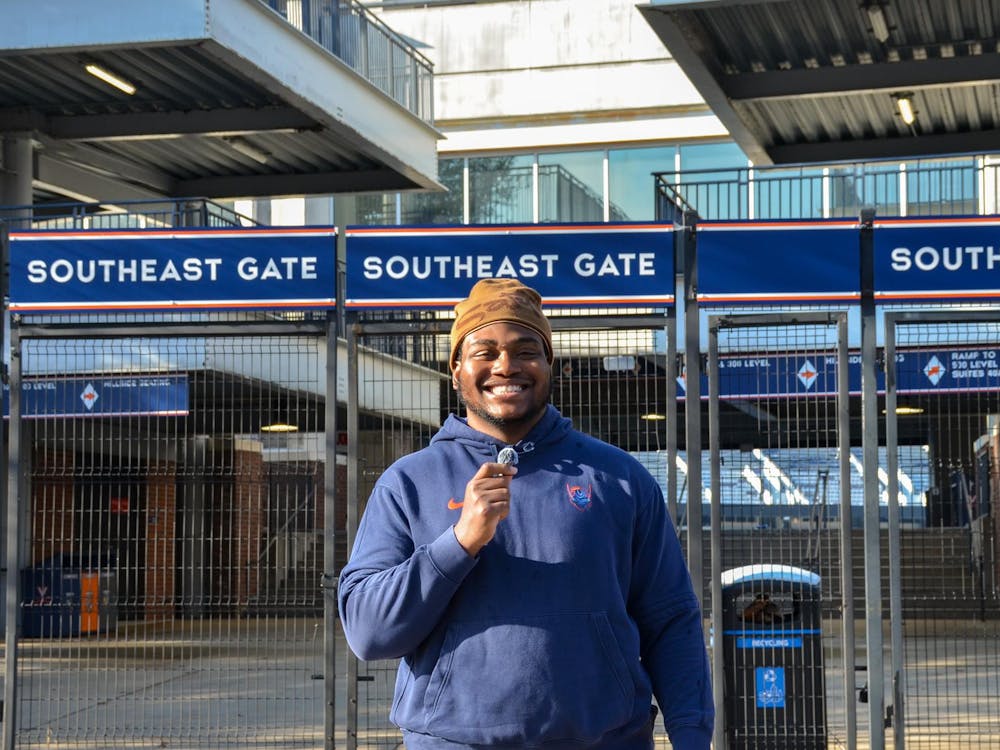Jonathan Hilliard has too much light in his room.On one of his four walls, daylight streams through the blinds from outside.On the opposite wall, light shines through from the hallway. And that light doesn't go out at night.
Akinyi Orinda has the opposite problem. Her lights are on a motion detector sensor, and the sensor is located behind her dresser.
So every half hour the lights go out, and she or her roommate has to get up and reactivate them.
These are just two problems experienced by first years displaced from traditional first-year housing by the unusually large size of this year's class.
Hilliard and Orinda, both first-year College students, are living in what used to be study lounges in the Woody dormitory.
Other first years are living in triples in other dorm rooms. Still others are living in formerly upper-class housing in Hereford College.
John Evans, director of housing accommodations, says the University's large first-year class is part of a nationwide trend.
"Statewide, James Madison University had at least 200 triples, and Old Dominion University was looking for hotel space to lease," Evans said. "Nationally, a lot more high school seniors are going into higher education."
In addition to a Board of Visitors-approved increase in the size of this year's first year class, more first years enrolled than the admissions office had predicted.
This has forced Housing to get creative.
A total of 28 triples were created in the Alderman Road dorms, and in order to prevent an even higher number of triples, several study lounges in Cauthen and Woody were converted into dorm rooms.
"They have walls of glass windows, so we put in many blinds, installed phone and data hookup and then installed furniture," Evans said.
The number of first years who lived in Hereford was also increased from last year's one hundred. In the future, it won't be possible to add any more first years to Hereford.
"We filled almost all of the double rooms in Hereford," Evans said. "The Dean of Students Office wants all first years in double rooms."
First years who were assigned to Hereford were also given an option to volunteer to be placed in triples or study lounges in the traditional first-year housing.
"Fifteen students took advantage of that offer," Evans said.
First-year College student Defne Gunay, who is living in a study lounge in Woody, was one of them.
"I volunteered; it's so much closer," Gunay said. "I didn't think it would have glass windows instead of a wall, but I don't mind. We just have two big windows."
Like many of the study lounge residents, Gunay and her roommate moved their stand-alone closets -- the same as those used in Lambeth and Bice -- against the inner glass wall to block some of the light coming in from the hall.
Gunay said noise from the hall is also a problem.
First-year Engineering student Stephanie Holcombe, Orinda's roommate, said she wasn't assigned to any room at all before Housing decided to convert the study lounges. She e-mailed Housing yesterday to ask about the motion detector lights.
Fellow first-year engineer Robert Gisiger has the opposite problem with the motion detector lights -- not that they turn off too often, but that they turn on when he comes in and his roommates are sleeping.
"I can usually turn it off fast enough," Gisiger said.
Most of the first years said living in the study lounges wasn't too bad, especially since they seem larger than the common dorm room, although the light from the hallway is a persistent problem.
Hilliard and his roommates have attempted to cover the inner windows with construction paper, but are worried they might not be allowed to keep the paper because of a restriction on decorating only 10 percent of dorm room walls.
"I wish they'd let us keep the construction paper," Hilliard said. "It doesn't get dark in here at all. Everyone admires our room, though."
First years living in Hereford have a whole different set of issues.
First-year College student Stacy Logsdon said she cried when she found out she would be living in Hereford.
Candace Ng, also a first-year College student, said she worried because her upperclass friends told her she wouldn't have a social life in Hereford.
However, she has found the reality not as bad as she feared.
"It's nice -- we live kind of far, but you get really close to the people on your hall," Ng said.
As an international student, she also feels that living in Hereford has enabled her to meet more international and out-of-state students. She says it seems that most of the displaced first years come from those two groups.
Logsdon and her roommate, first-year College student Palmer Curdts, agreed with Ng that the distance is a problem but the diversity is a good aspect of being assigned to Hereford.
"We've gotten to meet a lot of upperclassmen," Logsdon said. "And they have cars, as well as advice about a lot of things."
Both agreed that their proximity to Runk, widely regarded as the best dining hall, is an advantage of living in Hereford.
"I don't know if I'd request to live here again, but I'd come eat at Runk," Logsdon said.
The air conditioning is also a plus, although it's much needed after the trek to their room.
Curdts and Logsdon live on the top floor of the top Hereford house, Johnson.
"Once you get to the bottom of the stairs, you look up and it's like this continuum of stairs," Logsdon said. "You feel so hot and overwhelmed."
However, they are taking the stairs in stride, adopting the slogan of their house: "Johnson girls like it on top."
They also cited the quietness of their dorm as an advantage, although they admit they don't know what they're missing.
They haven't yet made it out to Rugby Road, a situation that they blame on the difficulty of getting a group together to ensure safety on the long way out and the long way back.
"We have to find the party, but we have a nice place to come back to," Logsdon said.
Their proximity to upperclassmen has helped counteract the distance to Rugby, Curdts said. For example, instead of attending the Newcomb Hall Crawl, the first years on the hall went to a transfer student party.
They also think the smaller number of first years might lead to closer friendships.
In the meantime, some of the triples are being slowly reduced as students who have not yet shown up confirm that they aren't coming.
First-year Engineering student Travis Sluka, one of Hilliard's roommates, says Housing has contacted him to say that he's on the top of the list to be moved, so he should be in a double by the weekend.
Logsdon says they have also been promised preferred housing next year.
"But you never know," Curdts said.






